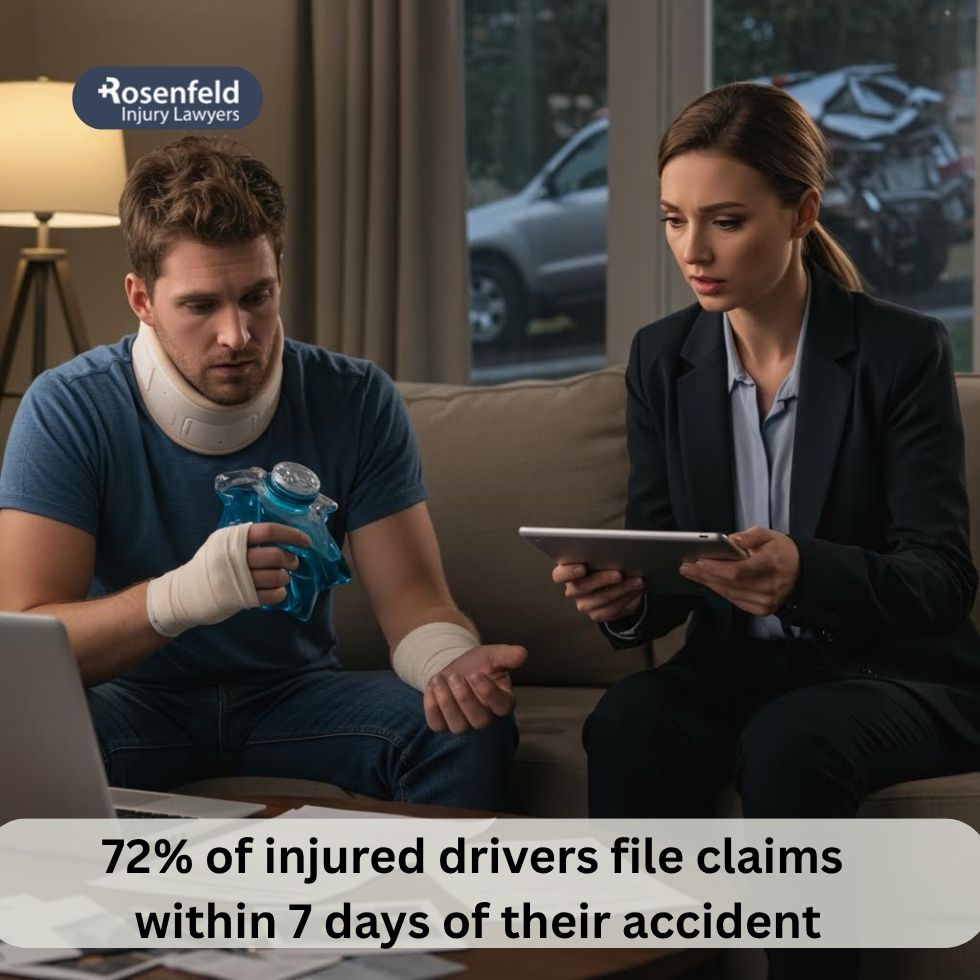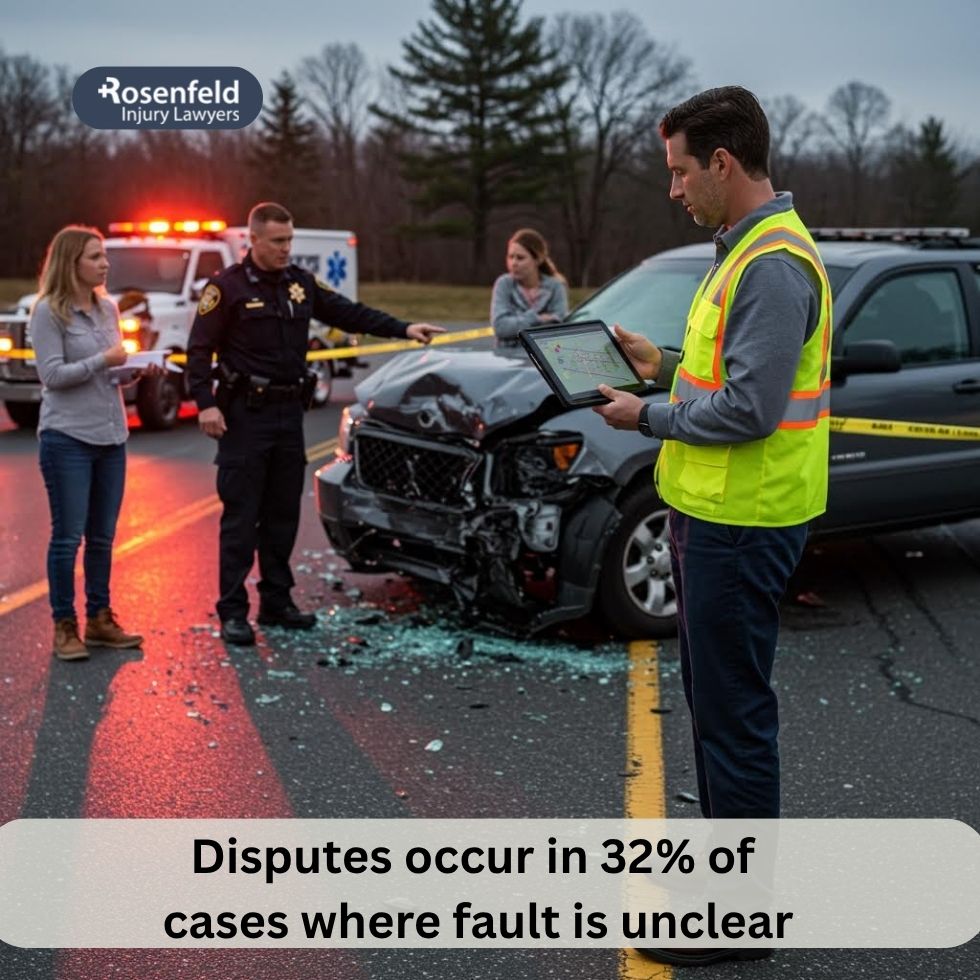- 24/7 Free Consultation: (888) 424-5757 Tap Here To Call Us
Who Pays for a Car Accident in Illinois?
When you’re involved in a car accident, one of the first questions you likely have is: Who’s going to pay for all this? Medical expenses, car repairs, and questions about coverage limits can be stressful, confusing, and expensive.
In Illinois, who is responsible for all those expenses depends on who was at fault in an auto accident. Understanding how fault and financial responsibility are determined can help you navigate the insurance claims process, hire an experienced car accident lawyer, and protect your right to seek compensation.
Illinois Is an At-Fault State for Car Accidents
Illinois follows a fault-based system to find fault for accidents and injuries in car accidents. The driver who caused the crash is at fault for the accident. Victims have several options for pursuing financial compensation:
- Filing a claim with the at-fault party’s insurance company
- Filing a personal injury claim with their own insurance company (in specific situations)
- Filing a lawsuit if a fair settlement cannot be reached
Filing a Claim with Your Own Insurance Company
In some situations, you will need to file with the at-fault driver’s insurance company. In other cases, you may need to file a claim with your own insurer. This might happen if:
- You were hit by an uninsured driver or an underinsured driver
- You were involved in a hit-and-run
- You’re using uninsured driver coverage
- You suffered injuries in a car accident and are filing for medical payments coverage (MedPay) or collision coverage.
Your insurer may later recover these costs from the at-fault driver’s insurer through a process called subrogation.
How Car Accident Compensation Works in Illinois
Car accident compensation may include both economic and non-economic damages. Economic damages cover:
- Medical treatment bills – even if your health insurance company covered these costs initially
- Lost wages
- Property damage
Non-economic damages include:
- Pain and suffering
- Emotional distress
- Loss of quality of life
- Disfigurement or permanent disability
In general, car accident compensation may include medical bills, lost income, pain and suffering, property damage, and other related losses.

How Insurance Carriers Handle Road Accident Claims
After a crash is reported, the insurance company will:
- Investigate the auto accident and assess who was at fault for the accident.
- Review medical records, police reports of the accident scene, and witness statements.
- Offer a settlement—often one that’s far lower than the claim’s true value.
Insurance companies work to minimize settlements, not maximize fairness. Having legal representation can make a major difference in the outcome of your claim.
What to Do if An Uninsured Motorist Hits You in Illinois
If the at-fault driver does not carry liability insurance or flees the scene, uninsured motorist (UM) coverage can help, covering:
- Medical bills for injuries in a car accident
- Lost wages for time off work while you recover
- Mental anguish, physical pain, and suffering
Illinois Car Insurance Requirements
Under Illinois law (625 ILCS 5/7-203), all drivers must carry minimum liability coverage of:
- $25,000 for injury or death of one person
- $50,000 for injury or death of more than one person
- $20,000 for property damage
Additional optional coverages—like MedPay (Medical Payments coverage), collision, or underinsured motorist (UIM)—can offer more protection.
What Happens If You’re Partially at Fault for a Car Accident?
Illinois uses a modified comparative negligence system under 735 ILCS 5/2-1116. This means:
- You can recover damages if you were not more than 50% at fault
- Your compensation is reduced by your percentage of fault
- If you’re 50% or more at fault, you cannot recover any damages
Comparative negligence can be confusing in car accident cases. A car accident attorney can help.
Types of Insurance Claims You May Need to File After a Car Accident
Depending on the situation, you may need to file one or more of the following:
- Liability claim against the at-fault driver’s insurance;
- Uninsured/underinsured motorist (UM/UIM) claim with your own insurance carrier;
- MedPay or personal injury protection (PIP) claim to cover medical costs;
- Collision claim for vehicle repairs regardless of fault.
A lawyer can help you determine which coverage applies and guide you through the paperwork.
The Settlement Process and Dealing with Insurance Companies
Once a claim is filed, your attorney or insurer will:
- Gather supporting evidence
- Submit a demand letter for damages
- Negotiate with the appropriate insurer
The case may be resolved out of court. If not, your attorney can file a personal injury lawsuit. Having legal representation can increase your settlement amount and reduce your stress.

When the Driver’s Insurance Company Denies Your Claim
If your claim is denied, don’t give up. Here’s what to do if the insurance company refuses to cover your personal injury claim, and when to consider legal action.
Insurers may refuse coverage based on:
- Alleged lack of medical proof that the victim sustained their injuries in a car accident.
- Disputes over liability and whether you have enough liability coverage for the claim.
- Missed deadlines or “technicalities”
A Chicago car insurance claims lawyer can challenge the denial, file an appeal, or take the matter to court if necessary.
Compensation for Family Members After a Fatal Car Accident
When a loved one dies in a crash, surviving family and friends may file a wrongful death claim. Compensation can include:
- Medical bills prior to the victim’s death
- Funeral and burial expenses
- Loss of companionship and financial support
- Emotional grief and suffering
Only certain relatives can seek compensation, and time limits apply—so speak to a wrongful death attorney as soon as possible.
Additional Liable Parties Beyond the Other Driver
Sometimes, more than one party is responsible for a crash. Examples include:
- Employers of negligent commercial drivers
- Vehicle manufacturers
- Government agencies
- Bars or restaurants
How Illinois’s “Dram Shop” Law Affects Drunk Driving Accident Claims
Under Illinois’ Dram Shop Act, victims may be able to sue businesses that served alcohol to visibly intoxicated patrons who went on to cause an accident. These third-party claims can be vital when the at-fault driver has little or no insurance coverage.
What If the At-Fault Driver Was on the Job?
If the at-fault driver was working at the time of the crash, such as a delivery driver, truck driver, or rideshare operator, their employer may be liable. In these cases, the company’s commercial insurance policy may offer significantly more coverage than a personal auto insurance policy.
How Long Do You Have to File an Auto Accident Claim in Illinois?
Under 735 ILCS 5/13-202, Illinois has a two-year statute of limitations for most personal injury claims stemming from car crashes. If you miss this deadline, you may lose the right to pursue compensation altogether.
Property damage claims typically have a five-year time limit. Wrongful death claims must also be filed within two years of the victim’s passing.
Understanding Illinois’ statute of limitations for filing a claim and why acting quickly is crucial.
Why You Need an Experienced Chicago Car Accident Lawyer
Insurance companies have entire teams dedicated to limiting settlements. You deserve someone in your corner who knows the law, understands the tactics they use, and knows how to fight back.
A Chicago car crash lawyer can:
- Gather evidence and establish liability, including proof of medical expenses arising from the accident and injuries sustained in the crash.
- Handle insurance negotiations
- Protect your rights under state law
- Maximize your financial recovery as you seek compensation
Injured in an Illinois Road Accident?

Speak with an experienced Chicago car accident attorney today. We offer free consultations and work on a contingency basis—you don’t pay unless we win.
Contact us at (888) 424-5757 or through our online form to discuss your legal options.
All content undergoes thorough legal review by experienced attorneys, including Jonathan Rosenfeld. With 25 years of experience in personal injury law and over 100 years of combined legal expertise within our team, we ensure that every article is legally accurate, compliant, and reflects current legal standards.







